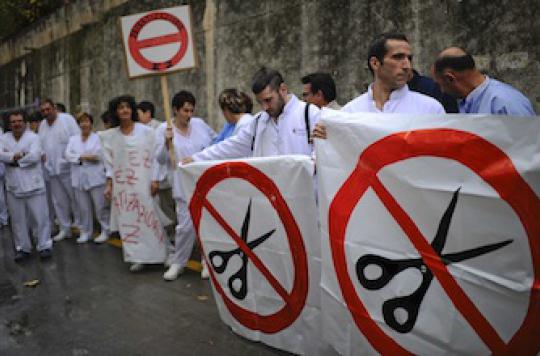The British journal The Lancet establishes a direct link between unemployment rate and suicide rate. And she accuses health ministers of indiscriminately cutting budgets.

The unemployment rate has reached a record level of 12% in the Eurozone. In Greece, Portugal and Cyprus, the austerity plans dictated by Europe follow and resemble each other. In France, we are not there yet but the new Minister of the Budget, barely installed in Bercy, did not hesitate to use the term, long banned, of “rigor”.
For almost five years, populations have been drinking glasses and the effects of the crisis on health are more and more noticeable. In 2011, the British medical journal, The Lancet, looked at Greece’s bedside. And the diagnosis was grim: “We are seeing […] very disturbing trends, a doubling of suicide cases, a rise in homicides, a 50% increase in HIV infections and people telling us their health has worsened but they can no longer see even doctors ‘they should do it,’ the study author said.
Two years later, The Lancet did it again. But this time it is the health of the whole of Europe that is being analyzed. In his report “Financial crisis, austerity and health in Europe”, published on March 27, the scientific journal underlines in particular that the suicide rate among those under 65 has increased in the Union since 2007, while it had been falling steadily for seven years. Another warning signal spotted by the Lancet: in Portugal, the number of deaths among more than 75% recorded a peak during the winter of 2012 compared to the previous year. The flu would not be the only culprit. Today, 40% of the elderly in Portugal live in poorly heated apartments.
+ 3% unemployed = + 5% suicide
The Lancet is not alone in perceiving these signals. The World Health Organization noted in early March that “an increase in unemployment of more than 3% in a relatively short time is associated with an increase of around 5% in rates of suicide and self-inflicted injuries. In Greece, the unemployment rate has jumped 5 points in a single year. In France, the curve is smoother, but it has taken one point per year, on average, since 2008. We will therefore have to monitor the suicide rate.
In the health centers of Médecins du Monde (Mdm) in France, the health effects of the economic crisis are also noticeable. “The number of consultations has climbed by 22% in three years,” points out Dr. Jean-François Corty, director of missions for France. And we see the working poor returning to our centers. They had disappeared since 1998 and the laws against exclusion. “To better reach these new precarious, Mdm will also open its first mission in France in rural areas.
Listen to Dr Jean-François Corty, director of the Missions France of Médecins du monde: “We are going to open a health center in Auvergne to meet migrants in poverty, these families who leave the cities for economic reasons.”
Passive health ministers
But what are the police doing ? Or rather what are the health authorities doing to cushion the shock of the economic crisis? To believe The Lancet, not much. “The voice of public health officials has been largely absent from the debate on how to respond to the crisis. Many health ministers have remained silent. The Lancet goes even further and accuses the Director-General in charge of health and consumer protection at the European Commission of having failed in his legal obligation to assess the health consequences of the austerity policies imposed by the Commission , the IMF and the European Central Bank. However, this troika demanded to make a living. In Greece, for example, reports the British review, European authorities have demanded that health spending does not exceed 6% of GDP. An unprecedented intrusion into the health affairs of a sovereign state.
On the occasion of World Health Day on April 7, Mdm also denounced the fact that “European health and social protection systems are faltering under the pressure and austerity measures launched by governments to respond to the crisis ”.
French health authorities were no exception to the rule. Admittedly, Parliament is in the process of voting for the generalization of complementary health insurance for all employees, but at the same time, the delisting of drugs continues and the remainder to be paid is increasing. And for Dr Jean-François Corty, “the questioning of our model of solidarity-based social protection does not date from 2008! The crisis has a good back. “
Temporary recession improves health
Economic recessions would not be so bad for your health as we want to say. “Contrary to popular belief, recent literature shows that mortality and health problems tend to decrease during recessions,” wrote Florence Jusot, professor at the University of Rouen and researcher at Irdes, in 2012 in “Health forums”.
“The increase in unemployment would free up time for treatment or physical activity, while the intensity of work would be greater in periods of strong economic activity, which would increase the risk of illness and accidents,” adds the researcher. Recessions are also associated with improved lifestyles. “Less alcohol, tobacco, better nutrition, more physical activity… The time freed up by the loss of a job would therefore be used to take care of oneself. Florence Jusot specifies that “only temporary increases in unemployment and temporary decreases in income would be beneficial. The state of health of the populations deteriorates if the crisis becomes lasting ”. Europe is going through its fifth year of crisis.
.
















